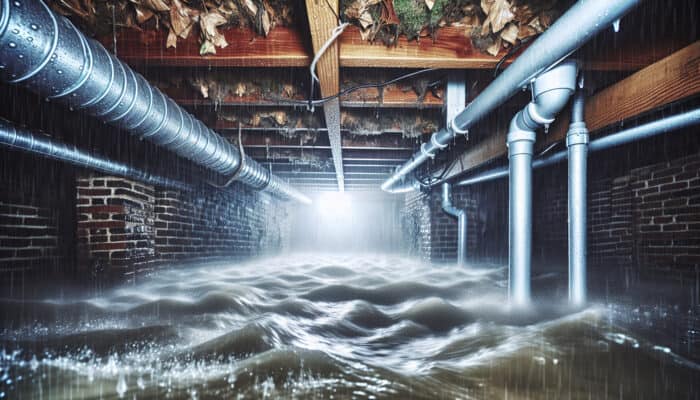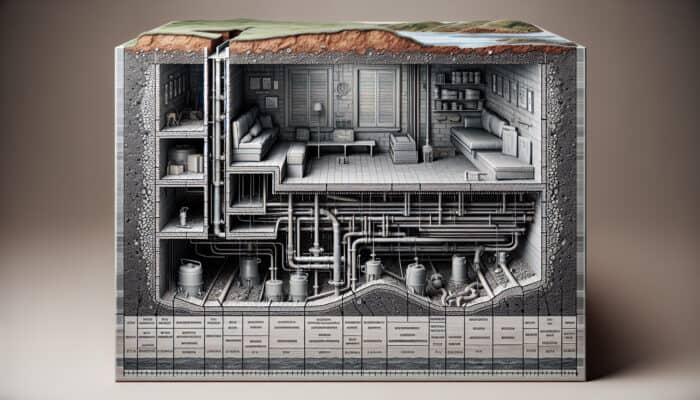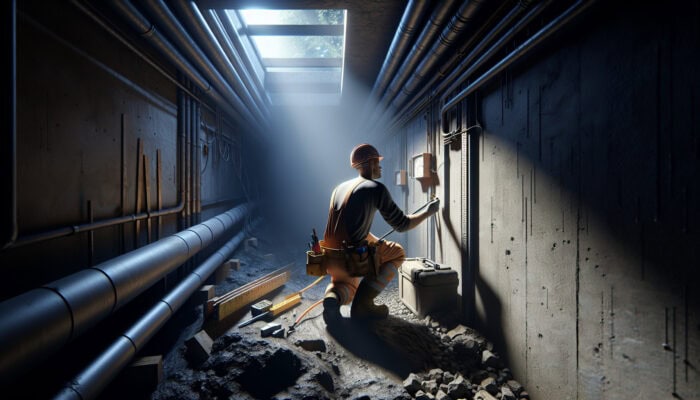Your Comprehensive Guide to Effective Crawl Space Drainage Solutions in Delta
What Is Crawl Space Drainage and Why Is It Essential for Homeowners?

Crawl Space Drainage Services in Delta: Crawl space drainage refers to the critical process of systematically removing excess water from the space located beneath a building. This practice is fundamental for preventing moisture-related damage, which can severely affect the structural integrity of homes in Delta. Given the local climate, characterised by significant rainfall, having a robust crawl space drainage system is not merely beneficial—it's a necessity for sustaining a healthy living environment. Neglecting this vital aspect can lead to dire consequences. Common issues that crawl space drainage services help to address include:
- mould and mildew growth
- Wood rot leading to structural deterioration
- Pest infestations in the crawl space
- Unpleasant odours from moisture
- Declining indoor air quality, which can affect health
- Foundation issues arising from water accumulation
By implementing a comprehensive drainage solution, homeowners can effectively shield their properties from a host of complications associated with water buildup.
Why Is Proper Drainage Crucial for Homes in Delta?
Proper drainage is of paramount importance for residences in Delta, owing to the area's specific climate and soil characteristics that can lead to substantial water accumulation beneath homes. The region experiences a notably wet season; without suitable drainage measures, this water can infiltrate the crawl space, resulting in complications such as mould, mildew, and enduring structural damage. Homeowners need to be vigilant and recognise the signs indicating a need for drainage services. These indicators include:
- Visible water accumulation beneath the house
- Presence of mould or mildew on walls or in the air
- Musty odours detected in the crawl space
- Cracks or bulges appearing in walls
- Increased pest activity around the home
- Elevated indoor humidity levels that feel uncomfortable
Timely recognition of these symptoms can help homeowners avoid costly repairs and reduce health risks associated with prolonged exposure to moisture.
What Are the Advantages of Engaging Professional Crawl Space Drainage Services?
Utilising professional crawl space drainage services is essential for effective water management, significantly reducing the likelihood of costly repairs and potential health hazards associated with excess moisture. Professionals use specialised equipment and techniques tailored to the unique conditions prevalent in Delta homes, ensuring a thorough resolution of drainage issues. Key advantages of employing expert services include:
- Expert assessment and diagnosis of specific drainage challenges
- Installation of high-quality, durable drainage systems designed to last
- Long-term solutions that require less frequent maintenance
- Increased property value and marketability due to improved conditions
- Enhanced indoor air quality, which substantially decreases health risks
- Compliance with local building codes and regulations, ensuring safety
Investing in expert drainage solutions not only protects homeowners' properties but also enhances their overall living experience.
How Is Crawl Space Drainage Successfully Implemented in Delta?

Understanding the Comprehensive Installation Process for Drainage Systems
The installation of crawl space drainage systems comprises several essential phases aimed at preventing water accumulation beneath homes. Initially, professionals perform a meticulous site assessment to identify the most effective drainage strategy. This may involve excavating trenches, laying drainage pipes, or installing sump pumps. The primary objective is to redirect water away from the foundation into designated drainage areas. The standard installation process includes:
- Thorough site assessment and evaluation of drainage requirements
- Excavation of trenches for the installation of drainage pipes
- Placement of perforated pipes or installation of sump pumps for effective water removal
- Backfilling trenches with gravel or other permeable materials to facilitate drainage
- Installation of waterproofing membranes if necessary to prevent moisture intrusion
- Final inspection and rigorous testing of the complete drainage system
By meticulously following these steps, professionals ensure that the drainage system is optimally positioned to handle excess water efficiently and minimise the risk of future complications.
What Are the Essential Components of a Reliable Drainage System?
A well-engineered crawl space drainage system comprises several critical components that work cohesively to manage water flow effectively. Understanding these elements aids homeowners in recognising the significance of professional installation. Key components include:
- Perforated drainage pipes that allow unobstructed water flow
- Gravel beds that filter and channel water away from the structure
- Sump pumps that actively expel water from the crawl space
- Waterproofing membranes that prevent moisture intrusion
- Drainage mats that enhance efficient water flow
- Inspection ports that facilitate easy maintenance access
All these components are designed to function harmoniously, ensuring that water is effectively redirected and that the crawl space remains dry and structurally sound.
How Long Does the Installation Process for Crawl Space Drainage Typically Take?

The duration of the installation process for crawl space drainage systems can vary considerably based on several factors, including the size of the area and the complexity of the system being installed. Homeowners can generally anticipate the installation to take anywhere from a few days to up to a week. Factors influencing this timeline include the type of soil, the accessibility of the crawl space, and the existence of any infrastructure that might complicate the installation process. For instance, rocky or clay-heavy soils may necessitate more intensive excavation, potentially extending the project duration. Homeowners should consult with professionals for a more precise estimate tailored to their specific situations.
What Are the Significant Benefits of a Well-Designed Crawl Space Drainage System?
The advantages of implementing a proper crawl space drainage system are extensive and impactful. Most importantly, effective drainage prevents moisture-related complications such as mould, mildew, and structural decay. Improved indoor air quality is another crucial benefit, positively influencing the health of the home’s occupants. The long-term advantages associated with maintaining a dry crawl space include:
- Enhanced structural integrity of the home, ensuring safety
- Prolonged lifespan of the foundation, reducing future repair costs
- Lower energy expenses due to enhanced insulation
- Minimised pest-related issues, enhancing comfort
- Increased property value and attractiveness to prospective buyers
- Peace of mind for homeowners regarding their investment
Investing in a dependable drainage system not only protects the home but also contributes to a healthier living environment for everyone residing within.
How Can I Ensure the Effective Maintenance of My Crawl Space Drainage System?
Routine maintenance of a crawl space drainage system is crucial to guarantee its long-term effectiveness. Homeowners should adopt a proactive approach by undertaking regular checks and cleanings as necessary. Important maintenance tasks include:
- Inspecting and cleaning drainage pipes to prevent clogs
- Verifying that sump pumps are functioning correctly and have backup power options
- Regularly monitoring for signs of water accumulation or damage
- Maintaining appropriate grading around the foundation to direct water away
- Cleaning gutters and downspouts to prevent overflow
- Scheduling annual professional inspections for thorough evaluations
By committing to these maintenance practices, homeowners can extend the lifespan of their drainage systems and protect their homes against moisture-related complications.
Expert Insights on Crawl Space Drainage Solutions in Delta
What Common Challenges Do Professionals Face During Installation?
Professionals working in the crawl space drainage sector often encounter various challenges during installation. Situations such as uneven terrain, existing utility lines, and diverse soil types can complicate the necessary drainage solutions. For instance, rocky soil may obstruct excavation efforts, requiring specialised equipment and techniques. Furthermore, if utility lines are located beneath the surface, professionals must navigate these carefully to avoid damage and ensure safety. A notable example involved a project where the team had to develop a customised drainage plan due to steep slopes and a high water table. Such challenges necessitate an experienced approach, underscoring the importance of hiring qualified professionals who can adapt to the unique conditions found in Delta properties.
How Can Homeowners Prepare for Drainage Installation Effectively?
Homeowners can take several preparatory steps to facilitate a smoother drainage installation process, potentially lowering costs. Firstly, clearing the area around the foundation and ensuring unobstructed access to the crawl space can expedite the work. Additionally, discussing any concerns or past issues with the service provider can yield valuable insights that help tailor the installation to meet specific needs. Actionable preparation steps include:
- Removing debris and landscaping elements near the foundation
- Ensuring access to any crawl space entry points
- Documenting any previous water issues or repairs for reference
- Consulting professionals about the specific soil and environmental conditions
- Reviewing project timelines and setting clear expectations
- Establishing a budget and timeline for project completion
By proactively preparing, homeowners can create an environment conducive to the installation team, leading to a more efficient and effective drainage solution.
What Recent Innovations Are Transforming Drainage Technology?
The field of drainage technology is continuously evolving, providing homeowners with innovative solutions that enhance both efficiency and sustainability. Recent advancements include smart sump pumps equipped with remote monitoring capabilities, allowing homeowners to track system performance in real-time. Eco-friendly materials are becoming increasingly popular, contributing to environmentally responsible construction practices. Moreover, advanced waterproofing solutions have emerged, offering greater durability and resistance to moisture intrusion. Experts indicate that these innovations not only improve the efficiency of drainage systems but also ensure compliance with contemporary environmental standards, emphasising a commitment to sustainable building practices.
How Do Professional Crawl Space Drainage Services Add Value?
Engaging professional crawl space drainage services offers numerous advantages that extend beyond mere installation. These experts ensure that systems are installed correctly, maximising their long-term effectiveness and minimising the risk of future complications. One significant benefit is that professionally installed drainage systems can prevent costly repairs in the future, such as foundation damage or extensive mould remediation. Furthermore, professionals are adept at navigating local building codes and environmental regulations, ensuring compliance while providing an extra layer of security for homeowners.
How Do Local Regulations Impact Crawl Space Drainage Practices in Delta?
Local regulations and building codes play a significant role in shaping the design and implementation of crawl space drainage systems in Delta. These regulations often dictate specific requirements for drainage solutions, including the materials permitted and the installation processes that must comply with environmental standards. Professionals in the field are well-versed in these regulations, ensuring that installations adhere to local laws while effectively meeting the homeowner’s needs. This expertise not only protects homeowners from potential legal issues but also guarantees the system’s long-term effectiveness.
A Comprehensive Overview of the Costs Associated with Crawl Space Drainage in Delta
What Factors Influence the Costs of Crawl Space Drainage Services?
The costs associated with crawl space drainage services can vary widely based on several factors. The size of the area requiring drainage, the complexity of the system to be installed, and the accessibility of the site are primary influences. Additionally, the type of soil, existing conditions that may require repairs, and any additional waterproofing measures can significantly impact the overall pricing. Homeowners should consider the following factors when budgeting for drainage services:
- Size of the crawl space and drainage area requiring attention
- Soil type and condition (e.g., rocky or clay-heavy)
- Accessibility of the crawl space (e.g., confined spaces versus easy access)
- Complexity of the required drainage solution
- Need for additional repairs or waterproofing measures
- Time of year (seasonal demand can affect pricing)
By understanding these variables, homeowners can better prepare for the financial aspects of their drainage projects.
How Can Homeowners Effectively Budget for Drainage Services?
Budgeting for drainage services necessitates careful planning and consideration of both immediate and long-term costs. Homeowners should account not only for installation expenses but also for potential ongoing maintenance costs. Setting aside a dedicated budget for routine maintenance is crucial for the long-term success of the drainage system. Homeowners can effectively budget by:
- Obtaining detailed quotes from multiple service providers
- Comparing services offered and their associated costs
- Considering potential long-term savings by preventing water damage
- Allocating funds for routine inspections and maintenance
- Exploring available financing options that may ease costs
- Reviewing any warranties or service plans offered by contractors
By thoughtfully planning and budgeting, homeowners can ensure their drainage needs are met without unexpected financial strain.
Are Financing Options Available for Drainage Projects?
Yes, many companies specialising in crawl space drainage services offer financing plans or payment options to make these critical services more accessible to homeowners. Financing can be advantageous for those who may not have the full amount available upfront but recognise the urgency of addressing drainage issues. Homeowners should inquire about available financing options, looking for plans that provide flexible payment terms and interest rates. Additionally, some companies may partner with financial institutions to facilitate easier payment options, allowing homeowners to prioritise the health and safety of their homes without undue financial burden.
What Are the Long-Term Benefits of Investing in Crawl Space Drainage?
Investing in crawl space drainage extends beyond immediate concerns and represents a long-term commitment to both financial stability and health. Proper drainage systems prevent structural damage, potentially saving homeowners substantial amounts in repair costs over time. Furthermore, effective drainage reduces the risk of mould growth, which can pose serious health threats to occupants. The long-term benefits of such investments encompass:
- Preservation of the home’s structural integrity, ensuring safety
- Reduction in energy costs due to enhanced insulation
- Increased property value, making the home more appealing to buyers
- Minimised health risks associated with mould and poor air quality
- Long-lasting peace of mind for homeowners regarding their investment
- Potential for lower insurance premiums due to reduced risk
These benefits highlight the necessity of proactively addressing crawl space drainage issues, leading to significant savings and improved living conditions over time.
Key Maintenance Strategies for Crawl Space Drainage Systems in Delta
What Signs Indicate That Maintenance Is Required for Drainage Systems?
Recognising the signs that maintenance is required for a crawl space drainage system is crucial to prevent major issues. Homeowners should remain vigilant and proactive, as early detection can avert substantial repair costs. Warning signs indicating that maintenance may be necessary include:
- Water pooling around the foundation or inside the crawl space
- Slow drainage or backups occurring in the drainage system
- Unusual sounds coming from sump pumps or drainage pipes
- Visible mould growth or musty odours within the space
- Cracks or shifts developing in the foundation
- Increased indoor humidity levels that compromise comfort
These symptoms should prompt immediate action to consult with a professional, as unresolved issues can escalate into more severe and costly repairs.
How Often Should Drainage Systems Be Inspected for Optimal Performance?
To ensure optimal performance, drainage systems should undergo annual inspections. However, homeowners in areas prone to heavy rainfall or flooding may require more frequent inspections to preempt potential issues. Regular maintenance not only aids in early problem identification but also ensures that the system operates at peak efficiency. During inspections, professionals will assess the functionality of sump pumps, check for clogs in drainage pipes, and evaluate the overall condition of the drainage system. By prioritising these inspections, homeowners can mitigate the risk of significant damage and maintain a healthy living environment.
What Best Practices Should Be Followed for Maintaining Drainage Systems?
Implementing best practices for the maintenance of crawl space drainage systems is essential for ensuring long-term functionality. Homeowners can adopt several effective strategies to guarantee their systems remain in optimal condition:
- Regularly clean gutters and downspouts to prevent overflow and effectively direct water away
- Maintain proper grading around the home to promote effective drainage
- Inspect and clean drainage pipes routinely to avoid clogs
- Check sump pumps for proper operation and battery backup functionality
- Promptly address any signs of water accumulation
- Schedule annual professional inspections for comprehensive evaluations
By adhering to these best practices, homeowners can prolong the lifespan of their drainage systems and protect their properties from moisture-related complications.
Success Stories: Transformative Crawl Space Drainage Initiatives in Delta
How Did Crawl Space Drainage Transform a Delta Home?
A recent case involved a Delta home grappling with significant moisture issues due to inadequate drainage. Homeowners reported persistent mould growth, dampness in the crawl space, and unpleasant odours infiltrating their living environment. Following a comprehensive assessment, a customised drainage system was implemented, leading to a remarkable improvement in living conditions. The outcome was a dry, healthy crawl space that significantly enhanced indoor air quality. The installation comprised perforated pipes and a sump pump, effectively redirecting water away from the foundation and preventing future moisture-related issues. The homeowners expressed satisfaction, noting an immediate enhancement in air quality and overall comfort within their home.
What Challenges Were Overcome During This Drainage Project?
During the drainage project mentioned, professionals faced several challenges, including rocky soil that complicated excavation efforts and limited access to the crawl space due to existing landscaping. To address these concerns, the team employed specialised excavation equipment and adjusted the drainage plan to accommodate the existing landscape. By utilising a flexible approach and innovative solutions, they successfully installed a drainage system that met the homeowners’ needs. This experience underscores the importance of adaptability and expertise in overcoming environmental challenges in drainage projects.
What Long-Term Benefits Did the Homeowner Experience After Installation?
Following the successful installation of the drainage system, the homeowner experienced numerous long-term advantages. Most notably, the crawl space remained consistently dry, effectively eliminating the risk of mould and significantly enhancing indoor air quality. Additionally, the improved insulation led to reduced energy costs, while the overall property value increased due to this proactive investment. With peace of mind regarding the structural integrity of their home, the homeowners felt a renewed sense of comfort and security. This case exemplifies how effectively addressing drainage issues can yield substantial returns on investment.
How Was the Drainage System Tailored for This Specific Delta Property?
The drainage solution for the Delta property was meticulously customised to address the site’s unique environmental conditions and challenges. Professionals conducted a thorough assessment of the soil type and moisture levels, determining the optimal configuration for the drainage system. This included employing a combination of perforated pipes and a sump pump, strategically positioned to manage water flow efficiently. Additionally, waterproofing membranes were incorporated to provide an extra layer of protection against moisture intrusion. This tailored approach ensured optimal performance, emphasising the significance of personalised solutions in drainage projects.
What Lessons Were Learned from This Crawl Space Drainage Initiative?
Key takeaways from the Delta crawl space drainage project included the necessity of conducting a comprehensive site assessment and the need for flexibility when addressing unique challenges. The experience highlighted the importance of adapting strategies to specific site conditions for professionals. Moreover, involving homeowners in the decision-making process proved invaluable, as it ensured that the final solution aligned with their expectations and requirements. These insights can serve as vital lessons for future drainage projects, fostering a proactive and collaborative approach to problem-solving.
How to Choose the Right Crawl Space Drainage Service Provider in Delta
What Essential Qualities Should You Seek in a Service Provider?
Choosing the right crawl space drainage service provider is critical for the success of your project. Homeowners should look for several essential qualities that indicate a professional and reliable service. Experience is fundamental; providers with a solid track record in the Delta area will be well-versed in local conditions and challenges. Certifications and licensing ensure that the company adheres to industry standards. Positive reviews and testimonials from previous clients can provide valuable insights into the quality of service offered. Additionally, a reputable provider should demonstrate a clear understanding of the unique drainage needs specific to Delta homes, offering comprehensive and customised solutions tailored to these requirements.
How Can You Verify the Credibility of a Drainage Company?
Confirming the credibility of a drainage company is a critical step before making a decision. Homeowners should ensure that contractors are properly licensed and insured, protecting them from liability in the event of accidents during the work. Reading testimonials and reviews from previous clients can also provide insight into the company’s reputation. Pursuing affiliations with professional organisations, such as industry associations, can further assure homeowners of quality service. Additionally, requesting references and examples of past projects can offer valuable insights into the company’s expertise and approach to drainage solutions.
What Key Questions Should You Ask Potential Service Providers?
When evaluating potential service providers for crawl space drainage services, asking the right questions can help homeowners make informed decisions. Inquire about the company’s experience with similar projects and their familiarity with local conditions. It's essential to understand the materials they plan to use, as this can impact the durability of the system. Homeowners should also discuss warranty options and the company's plan of action in case issues arise during or after installation. Finally, understanding their approach to tackling unexpected challenges can provide insight into their adaptability and expertise.
Frequently Asked Questions (FAQs)
What Is the Purpose of a Crawl Space Drainage System?
A crawl space drainage system is specifically designed to efficiently remove excess water from beneath a home, preventing moisture-related damage and ensuring a healthy living environment.
Why Is Crawl Space Drainage Critical in Delta?
Crawl space drainage is essential in Delta due to the region’s wet climate, which can lead to water accumulation and mould growth if not effectively managed.
How Can I Determine If I Need Crawl Space Drainage Services?
Signs that indicate a need for drainage services include water pooling, mould growth, musty odours, and visible cracks in the foundation.
What Does the Installation Process Entail?
The installation process typically involves site assessment, excavation, laying drainage pipes, and installing sump pumps to divert water away from the foundation.
How Long Does the Installation Usually Take?
Installation time can vary but generally ranges from a few days to a week, depending on the size of the area and the complexity of the system.
What Maintenance Is Necessary for Drainage Systems?
Regular maintenance involves cleaning drainage pipes, inspecting sump pumps, and ensuring proper grading around the foundation to direct water away from the structure.
What Are the Costs Associated with Crawl Space Drainage?
Costs can differ based on the area size, soil conditions, and installation complexity, with multiple factors influencing overall pricing.
Are Financing Options Available for Drainage Services?
Yes, many companies provide financing plans to make drainage services more accessible to homeowners concerned about upfront costs.
What Are the Long-Term Advantages of a Crawl Space Drainage System?
Long-term benefits include preventing structural damage, reducing mould growth, increasing property value, and improving indoor air quality.
How Often Should I Inspect My Crawl Space Drainage System?
It is advisable to inspect crawl space drainage systems annually, with more frequent checks in areas prone to heavy rainfall or flooding.
Connect with us on Facebook!
Presented By: Crawl Space Drainage in Delta
The Article: Crawl Space Drainage Services in Delta: Your Canadian Solution First Published On: https://pacificbluemechanical.ca/
The Article Crawl Space Drainage Services: The Canadian Solution in Delta Was Found On https://limitsofstrategy.com


